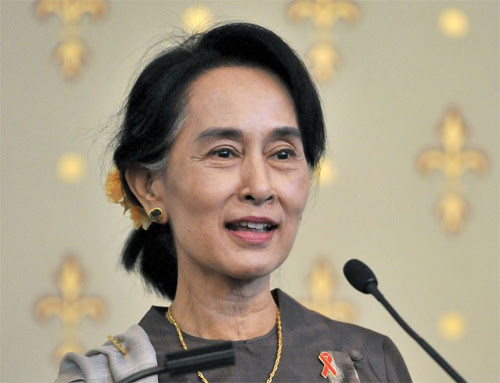Many in the ruling party and the armed forces are against amending the charter article stipulating the qualifications of the country’s top executive, according to a highly placed government official speaking to SHAN yesterday (30 December 2013).
The source, who has requested anonymity, said, “Article 59 (f) most likely will not change.”
Military-drawn constitution says for a citizen to become a president or vice president, himself/herself, “one of the parents, one of the legitimate children, or their spouses not owe allegiance to a foreign power, not subject to foreign power or citizen of a foreign country. They shall not be persons entitled to enjoy the rights and privileges of a foreign government or citizen of a foreign country.”
Aung San Suu Kyi, who is a widow of a foreigner and mother to two alien sons, has declared her aspiration to the illustrious office.
 Many, according to the source, especially the traditionally “security conscious” military, fear its amendment as demanded by the opposition will make way for later wannabes whose loyalty may be divided. “I personally have nothing against her,” he said. “But this article should not be removed for her sake only to put it back again in order to prevent questionable persons from taking over the office afterward.”
Many, according to the source, especially the traditionally “security conscious” military, fear its amendment as demanded by the opposition will make way for later wannabes whose loyalty may be divided. “I personally have nothing against her,” he said. “But this article should not be removed for her sake only to put it back again in order to prevent questionable persons from taking over the office afterward.”
The decision however rests with the Union Assembly dominated by the ruling Union Solidarity and Development Party (USDP) and the military.
“She should take a leaf from Sonia Gandhi,” he added. “Lead the party herself but nominate someone else to be the president instead.”
Italian-born Sonia Gandhi is considered the de facto leader of India’s ruling Congress Party.
According to Radio Free Asia, 26 April 2013, the President’s Office minister U Aung Min told the Burmese community in the United States, while on a visit there, that the 2008 constitution would be amended to allow Aung San Suu Kyi to become a presidential candidate in 2015.
Naypyitaw has formed a constitution review commission to see how the 2008 constitution could be amended before the upcoming 2015 elections.
“As for the people, especially the (non-Burman) ethnic peoples, we will do our best to accommodate them within the powers granted by the constitution,” he concluded. He did not elaborate.
The states and regions have called for state/regional chiefs to be elected (and not appointed by the President), for state/regional governments not to be subordinate to the Union Government’s home ministry and for equitable share of the revenue.



